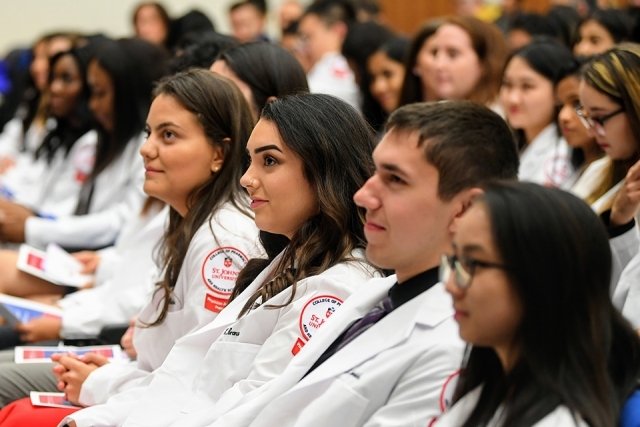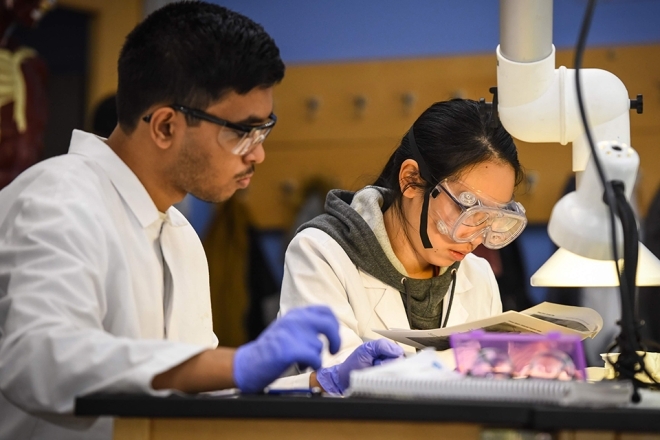

UG
Doctor of Pharmacy
St. John’s University offers a six-year, entry-level Doctor of Pharmacy program.
- Home
- Academics
- Majors and Programs of Study
- Doctor of Pharmacy
St. John’s University offers a six-year, entry-level program that leads to the Doctor of Pharmacy Degree (Pharm.D.) This program is designed to provide students with the clinical and academic skills and knowledge needed to deliver outstanding patient care in all practice settings.
The first two years of the program begin with the introduction of analytical and communication skills made possible by a broad science and liberal arts foundation. These courses are combined with introductory pharmacy coursework. In the final four years of the program, students gain an intensive foundation in the basic and applied pharmaceutical and clinical sciences.
In keeping with the metropolitan, Catholic and Vincentian mission of the University, students gain firsthand clinical experience serving diverse, often marginalized and disadvantaged communities at more than 180 practice sites throughout the New York-Metropolitan area.
The Doctor of Pharmacy degree program is accredited by the Accreditation Council for Pharmacy Education. Learn more about our accreditation below.
- Degree Type
- Pharm.D.
- Area of Interest
- Nursing, Pharmacy & Health Sciences
- Associated Colleges or Schools
- Program Location
- Queens Campus
- Required Credit Hours
- 201
Mission Statement
The Doctor of Pharmacy Program prepares graduates to serve as medication experts who have the knowledge, skills, and abilities needed to promote and deliver outstanding patient-centered care in all contemporary pharmacy practice settings with a global perspective. Graduates will be effective leaders, dedicated scholars, and moral and ethical practitioners within interprofessional healthcare teams.
Vision Statement
The Doctor of Pharmacy program will attain a level of global distinction, preparing our graduates to serve the needs of patients, the profession, and the healthcare system and instilling a commitment to cultural sensitivity and the underserved in urban environments.
Educational Philosophy
We develop our graduates into compassionate, caring, competent members of the healthcare team by providing strong foundational knowledge in the basic and biomedical sciences through abilities-based instruction that adequately prepares our graduates for a career in professional pharmacy practice. Our students participate in academic service-learning opportunities early and often in our curriculum to demonstrate the benefits of pharmacist-provided patient care in an urban, culturally diverse, underserved patient population in keeping with our Vincentian mission and in accordance with the University’s commitment to global education. Our distinguished faculty share their knowledge and experiences using a variety of teaching methods suitable for students with different learning styles. Our programmatic goals and objectives are met using a diverse mix of classroom, laboratory and abilities-based learning exercises. Lectures, group projects, active learning, simulation exercises, and real-world experiences combine to provide students an opportunity to grow into independent practitioners ready to participate as members of the interprofessional healthcare team. Our graduates are equipped with the knowledge, skills, and abilities necessary to be healthcare providers and lifelong learners who are adaptable to an ever-changing local and global healthcare environment.
Accreditation
Doctor of Pharmacy Accreditation
The Doctor of Pharmacy degree program at St. John’s University College of Pharmacy and Health Sciences is fully accredited by the Accreditation Council for Pharmacy Education (ACPE), 135 S. LaSalle Street, Suite 4100, Chicago, Illinois 60603. Accreditation standards are available via the ACPE website at acpe-accredit.org.
Complaint Policy
The ACPE is required by the U.S. Secretary of Education to require its pharmacy programs to record and handle student complaints regarding a school’s adherence to the ACPE Standards. To comply with this mandate, St. John’s University College of Pharmacy and Health Sciences has established the following procedure for students who wish to file a complaint about the school’s ability to meet accreditation standards or adhere to ACPE policies and procedures:
- Students should review the ACPE Standards at the ACPE website.
- Students should prepare a typed statement identifying the nature of the complaint, standard(s) violated, and specific facts when pertinent (times, places, persons involved).
- The complaint should be submitted to Anne Lin, Pharm.D., FNAP, Dean, College of Pharmacy and Health Sciences, St. Albert Hall, St. John’s University, 8000 Utopia Parkway, Queens, NY 11439.
- In addition to the written complaint, the student filing the complaint is also welcome to make an appointment to meet with the appropriate school administrator(s) to discuss his or her complaints and options for resolution.
- The Dean will work with appropriate administrators, committees and staff to resolve the complaint, if appropriate, and respond accordingly to the student filing the complaint.
- Alternatively, the student may file the complaint directly with ACPE at 135 S. LaSalle Street, Suite 4100, Chicago, Illinois 60603 or acpe-accredit.org/complaints or email [email protected].
- If the student filing the complaint is not satisfied with the response provided by the school then they may also contact ACPE at the above address
- A record of written complaints about the school’s adherence to ACPE accreditation standards or policies and procedures will be maintained for ACPE to review at the time of the accreditation site visit.
Licensure Requirements
Upon completion of the Doctor of Pharmacy program, each graduate must successfully complete the licensing requirements, which will include specific examinations in the State(s) in which he/she chooses to practice.
Professional licensure and certification requirements often vary from state to state. St. John’s University has not determined requirements for individual states beyond New York. If you reside or plan to reside outside New York you are strongly encouraged to contact the appropriate state licensing agency in that state to seek information and guidance before beginning the program.
Department Contact
John Conry, Pharm.D., AAHIVE, FNAP
Senior Associate Dean of the Pharmacy Program
Office of the Dean, St. Albert Hall, Room 171
Unique Features of the Doctor of Pharmacy Program
State-of-the-art technology is incorporated into the curriculum and students benefit from studying in ultra-modern basic science, pharmacy simulation, and applied science laboratories.
Doctor of Pharmacy students gain essential practical experience during their Advanced Pharmacy Practice Experiences at more than 160 pharmacy practice sites and healthcare institutions affiliated with St. John’s University.
Students in the pharmacy program gain critical experience with a variety of opportunities to participate in Interprofessional Education (IPE) with other students and faculty associated with our other health-related majors offered by our college as well as with students and faculty from affiliated medical schools and healthcare institutions.
Students also benefit by having the opportunity to join any of the more than 180 student clubs and organizations available at St. John's. Students in the pharmacy program may be particularly interested in our wide array of pharmacy and health-related student organizations, including professional societies, honor societies, practice-specific organizations, and professional fraternities and sororities.
The College’s Academic Success Center (ASC) provides academic support to enhance student success in the various programs. The center provides group and individualized tutoring for a variety of professional courses within the professional curricula of the College. In addition, the ASC provides workshops throughout the academic year on various topics to ensure student success.

Global Approach to Education
Students enrolled in the Doctor of Pharmacy Program have the unique opportunity to complete a semester (Spring of 2nd year) of coursework abroad – living and learning at our campus in Rome, as well as at our location in Paris, France. Our students have an additional opportunity to study abroad in their last year when they can take a 3-credit elective course at our Rome campus and travel abroad for four weeks.

Co-Curriculum
The co-curriculum refers to activities and learning experiences that occur outside the requirements of the didactic and experiential curriculum that complement, augment, and/or advance the student’s learning and professional development to meet the established learning outcomes.
The co-curriculum consists of required and self-selected activities that enhance our students’ development related to the knowledge, skills, abilities, and attitudes associated with direct patient care, cultural competency, effective communication, self-awareness/development, leadership, innovation and entrepreneurship, professionalism, and service to others, including service as citizens in a global society.
The co-curriculum also encourages students to participate in self-directed and lifelong learning through professional development requirements developed by each student.
Program Competencies
The following are Core and Practice Competencies associated with the Doctor of Pharmacy.
Core Competencies
-Analyze information, problem-solve and make decisions
-Gain in-depth knowledge about scientific methodology
-Effective written and oral communication skills
-Learn how to incorporate information technology systems and integrated computer technologies into pharmacy practice
-Integrate the University’s Vincentian values and mission into pharmacy practices
Practice Competencies
-Deliver patient-centered care as part of a healthcare team
-Evaluate patient care from legal, cultural, economic and professional perspectives
-Manage health care system resources to guarantee patient access
-Coordinate safe, time-sensitive medication distribution
-Gain knowledge of informatics
-Research professional, lay and scientific literature to ascertain accurate up-to-date drug information
-Design a patient-specific medication regimen
-Recommend and monitor medicine dosage taking toxicity and efficacy into account
-Successfully manage a patient-centered practice
-Promote community
Admission
The program requires two letters of recommendation, a personalized essay, a summary of the applicant’s extracurricular activities, and a signed acknowledgment of the program’s Technical Standards. In addition, applicants to the program are expected to have completed at least one year of high school chemistry.
Please review our Admission Deadline Dates for updates to the Pharm.D. application requirements.
For more information about admission to this and other acclaimed undergraduate programs at St. John’s University, please visit Undergraduate Admission online. Or contact us directly at the campus of your choice:
Admission Office - Queens Campus
718-990-2000
[email protected]
Interested in Nursing, Pharmacy & Health Sciences, but not sure if Doctor of Pharmacy is right for you?
Related Programs
GR
Identify and address health care problems at both the individual patient and population level
- Queens Campus

